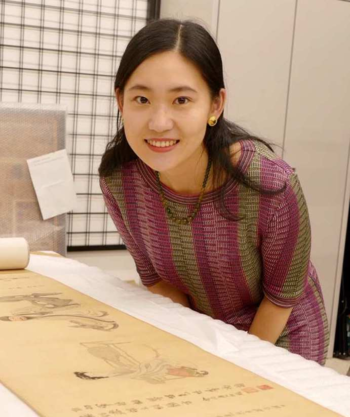Yizhou Wang

Fellow in the project "Epochal Lifeworlds: Narratives of Crisis and Change"
Short Biography
Wang Yizhou is research assistant professor at the Hong Kong Baptist University. With a PhD in Chinese art history from Heidelberg University, WANG Yizhou (born in Chongqing) has been trained in East Asian art history in the British, German, and Japanese university systems. Before her doctoral study, she studied Japanese and Korean art history at the School of Oriental and African Studies (SOAS), University of London, and then she received an M.Litt. in Arts of China from the University of Glasgow. Later, she worked at the Calligraphy and Painting Department of the Palace Museum Beijing in 2014. She was a visiting research associate at Kyoto University and then the University of Tokyo in the years 2017 and 2018. In 2022, she was a research fellow of the BMBF-funded joint project “Worldmaking from a Global Perspective: A Dialogue with China” at the Joint Centre for Advanced Studies, Germany; and she was also a virtual faculty resident of Plant Humanities Initiative at Dumbarton Oaks, trustees for Harvard University. She is now a research assistant professor in art history and theory at the Academy of Visual Arts of Hong Kong Baptist University. She has published peer-viewed articles in Ming Qing Studies, Research on Women in Modern Chinese History, Chung Cheng Chinese Studies, and edited volumes since 2014. Her research interests cover various topics in East Asian art history, ranging from painting to photography and from medieval and early modern periods to modern times. She has been invited to give talks or lectures hosted by institutions in London, Paris, Berlin, Heidelberg, Leiden, Venice, Lisbon, New York, Indiana, Toronto, St. Petersburg, Tokyo, Shanghai, Taiwan, New Delhi, etc. She has (co-)organized numerous conference panels internationally and the international interdisciplinary workshop “Living an Epoch with Nature: Plant and Spatial Representations in the Ming-Qing Transition” at Heidelberg University. Besides academic research, WANG Yizhou is also enthusiastic about experimenting with curatorial practice and video arts. She is devoted to exploring the transformation of intellectual ideas and arguments into visual arts.
Project
Voices of Nature and Landscape in Artful Spaces of Transitions: From Ming-Qing to Contemporary ChinaWang Yizhou's research project focuses on the visual and literary representations of plants, e.g., willows, pine trees, and the natural landscape during the seventeenth-century Ming-Qing transition, an age when China experienced severe climate changes and deterioration in the “Little Ice Age” which led to the great famine, social unrest, and the governance vulnerability to the nomadic invasions. To survive in the severe natural and social disturbance, “moving” and “hiding” became two major interwoven themes in the Ming-Qing period. When the actual words or communications were difficult to come out for varied reasons during crises, creating imageries of nature, plants, and the landscape became a pathway for either personal or collective expressions as a means of relief and therapy. The human defense and confrontation in the Ming-Qing crises were transplanted to the pictorial and literary representations of plants and natural landscape. This project investigates the following questions: How might have the transitional epochs of constant changes, natural calamities, and social crises stimulated artistic innovations and creative cultural practices? How did artists or poets in China react to changes, represent human-nature relations in arts, and interact with nature in lived experiences and changing spaces? How could the representations of plants and natural landscape create “voices” for the human state of mind? How did the changing environment and landscape with its own agency alter our understanding and mind imagery of the world? Additionally, this research takes the artistic practices involving human-nature interactions in the 1950s-early 1960s and the post-1980s contemporary period (including the most recent pandemic era) into consideration. It attempts to discuss how the artistic and cultural practices of the past, particularly in the Ming-Qing transition, could have played a role in contemporary China and how the reflected ecological concepts of the past could dialogue with the present epoch experiencing transitions.
